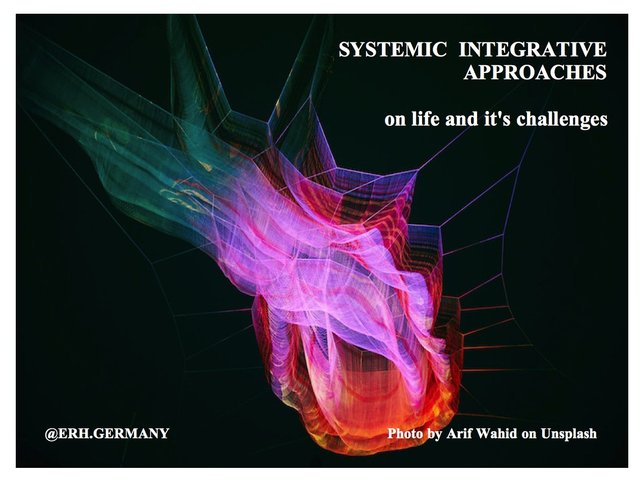YOUR RAISING - MY UPBRINGING - FINAL PART. From Horror to Humor Scenario.

Welcome back. Down below you find some scenarios where appropriate strategies are helpful. I chose the scenarios according to how they usually occur.
As this is my final part on this topic the series ends here - read also Part one and two.
Before coming to practice advice, it's important to ...
distinguish between "violence" and "dispute".
Because separate parents are still a system, the principle of the functioning of systems applies. The fact that parents no longer live in a common household is only significant in that the framework conditions have changed, but not in that the parties involved - parents and their children - continue to relate to each other. A "disturbance" in the system means, simply put, that when a part of the system starts to move, it influences the movement of all other parts. To the extent that parents exercise joint custody of their children, they cause a permanent movement due to their communication. How the influences are perceived now depends on whether the communication is judged to be helpful or disruptive, for example. The systemic idea is based on the positive assumption that every disturbance is aimed at improving a situation [1] [2] . Only the way is misleading when aggressive forms of expression dominate on the surface. From a systemic point of view, it is said that even after aggressive or otherwise inadequately perceived forms of communication, there is always a good intention behind it: that of trying to be understood.
To put it bluntly, parents mean well, but behave awkwardly.
It is advised that parents find non-violent communication. To distinguish between "disputes" and "violence" [3], I quote : "Violence is fundamentally different to dispute. In a dispute both of the persons involved are equal and communicate their respective arguments at the same eye level. In the case of violence, those involved are at different levels (“eye levels”). Here, the issue is one of power and control; this is also the objective of violence.
A dispute may also be concerned with achieving one’s own way, but not with the objective of exercising power and control over the other person. This is not a matter of repressing the other person or wanting to win at any price. The emphasis is on agreement, including the agreement to establish a compromise."

The following examples can be seen as exercises designed to raise awareness of how parents can react to awkward communication efforts, except with insecurity or anger.
1. The other parent is making an accusation. "You are so irresponsible! Can't you think for once?"
Despite anger or insecurity, you have the possibility to ask instead, e. g.:
What do you want me to do for our child?
If there is a clear answer, you can decide whether you want to take action or not. If there is no clear answer or even more accusations, ask the question again. That will make the other parent to think about the matter. It can avoid to start fighting.
Reveal your point of view without questioning or criticizing the other parents view. Every parent is sometimes uncertain or has sorrow on a particular subject that is sensitive to him or her. By taking the other person's concern seriously and not marginalizing or trivializing it, you show him or her the respect that you also want for yourself.
2. You are under heavy fire. You feel unjustifiably criticized and disparaged in your role as a parent. The other one goes so far as to insult you and blame you for the negative development of the child.
"It's all your fault if our daughter fails at school!"
Make it clear to yourself that the other one could be driven by great fears or strains.
Reject accusations calmly. If you are in danger to pick up speed or becoming too excited, postpone the conversation and say that you want to calm down first and come back to the matter later.
Make your point of view clear without justification.
Tell the other parent that both of you need to find a way of dealing with the child within your possibilities.
Give your assessment of your child's development, which is neither whitewashed nor painted black. Ask the other parent instead of speculate about his findings.
If you share a particular concern and you hesitate to admit it, focus on the matter, not on the other parent's method. Confirm that you have a similar concern and that you have either discovered a solution for yourself or would like to be advised on it from a third party. Be honest if you haven't found a solution yet and say that you will think about it and let the other know.

3. The other parent seems to be too carefree in a matter of great importance to you
What are the aspects that challenge you?
What is the concrete background to the accusation of carelessness that you recognize in the other parent?
Imagine the other parent describing you as careless and disinterested in something that doesn't really seem to be worth so much thought to you. How do you feel about that? Do you feel guilty or caught?
Does some of the other parents principles appear to you in such a way that you actually consider them unimportant? If so, you should make this transparent to the criticising parent. Give him a reason to believe that each of you has priorities and that it's good that they differ in order to cover a variety of aspects in raising your child.
Don't worry about possible feelings of guilt, because they won't get you anywhere. You are as a human being as you are and not as you should be. To get rid of the guilt feeling, you may waste valuable energy trying to convince the other one of your innocence. A sense of guilt can be purposeful though, when it triggers solution-oriented thinking. You say to yourself, "It's true about what the other one criticises about me." Then don't be too proud to accept a painful criticism and tell the other parent what you will do differently in the future.
If you create a change of perspective, you achieve two things:
- You have more understanding for the actions or omissions of the other parent.
- You have more support in the other parent than you thought.
First, you don't blame the other parent for his carelessness so much (you realize that you have some issues in your child's upbringing that you don't waste much energy and thought on, either).
Secondly, you can see one form of support in the carelessness of the other (remember: „Positive connotation"): the trust that the other parent places in the child is often part of the carelessness. At the same time, the other parent frees you from a difficult topic that leads to headaches and tedious arguments at home and in contact with the child. If the same subject had a similar explosive nature over there, it would probably do your child more harm than good. In this way, parents create a balance [4]which, due to the diversity of priorities, ensures that there is a balance that is necessary for the child's relief.
Split parents often forget that even in existing families, the positions of mother and father differ from each other and that there is always a balancing function of both parents which are either consciously or unconsciously expected and controlled by the other. You don't get rid of this only because you are divorced or broke up.
4. The other one comes at the last moment with a request / change in the planning
You have the feeling that you have to throw everything overboard because of the other person and have to adjust your schedule according to the ex partner.
Don't jump on it. Do not hesitate to consider whether you would like to comply with the request or reject it.
The reasons why someone tosses a plan usually have nothing to do with you. Remember that you may be the next time the one who wants to change the schedule or need support.
Avoid using comments such as "you could have thought of that earlier!" or "what do you actually think I am, your emergency service? You can say instead that the change is inconvenient, requires a lot of effort and you think that the other parent owes you the same thing in the future.
If necessary, take a day or two to think about the request or demand. Otherwise you can shorten the cooling-off period according to your needs, e. g. two hours.
Meanwhile ask yourself: "would I be okay with a concession? Or is a compromise out of the question because I have too many disadvantages of my own?"
Do not compromise if this encourages you to accuse the other parent of "constantly pushing you to make concessions." When you decide, stand by your decision. Don't blame the other parent retrospectively of having made a concession.
In any case, counterproductive is when parents focus too much on a problem of their child. As a consequence, they forget to encourage the child and not recognize his or her resources. In most cases, the child does not have a "problem" or does not function properly, but the parents have too few positive strategies and solutions.

If parents get aware of this, they tend to worry or focus only on the child whilst it would be smart to take the view on the adults. Once parents found out that changing their behavior and put trust into the child and themselves, it will normally recover quickly from its difficulties or anxieties.
This was the final Part of the series. I hope you found it helpful.
Thank you for your attention.
[1]: German article - Dr. Bernd Schmid: http://www.systemische-professionalitaet.de/isbweb/component/option,com_docman/task,doc_view/gid,1897/ Translated paragraph, Page 2: "Faults are solutions: What is a disturbance for one person can be the best solution for the other, measured against his or her understanding of reality. A disorder such as difficulties at school can be seen from the understanding of a child's reality as a contribution to the care of important concerns. It is generally assumed that the fault is currently the best solution in a system. This is why we are looking for descriptions that give this assumption plausibility. To just want to eliminate the disturbance would mean to eliminate solutions in this logic, whereas counterforces would understandably arise if the problem "supplied" with the disturbance remains."
[2]: Institut für Teamdynamik (Institute for team dynamics)/Germany - with kindly allowance from Prof. Armin Poggendorf. Translated quote 1st paragraph: " What is "systemic"? Every systemic approach is characterised by the fact that one does not focus on the problem carrier, but rather takes a whole system into account. The individual is only regarded as an individual to the extent that he/she acts as an element on the system and how he/she is exposed to its field of action. Thus, the systemic counselling and therapy also sees a "symptom carrier" in each individual and thus takes into account that the problematic issues which are shown on the individual must not be his or her very own and isolated symptomatics to be considered. From a systemic point of view, a disorder manifests itself on the problem carrier, which is caused by a disturbed process in the entire system. Of course, the success of an individual is also the progression of a living, learning system."
[3]: ©Broken Rainbow e.V. 2008 - Overview Systemic Therapy:https://taeterinnen.org/material/systemic_therapie_en.pdf
[4]: a personal recommendation from me: Shortfilm "Balance" from the German Lauenstein brothers. It is a surrealist stop-motion animated film, released in 1989. It depicts in a very impressive form the interdependence between humans
As a consultant I work with family systems and the related issues within a system - this includes singles and couples/separated couples & patchwork families. My other focus is personal coaching including all Pillars of human identity (extract of Helmut Kames' diploma thesis, unfortunately only in German).
Systemic counselling involves counselling people with regard to their respective social systems in the respective context. Among other things, it includes advice on the family context. Systemic consulting is based on system theory, e. g. Talcott Parsons, constructivism, e. g. Fritz B. Simon and second-order cybernetics, e. g. Heinz von Foerster, Cybernetics of Cybernetics, The Control of Control and the Communication of Communication Images: Empathy: Pixabay follow me: @erh.germany
Dogs: Pixabay
Happy child: Photo by Senjuti Kundu on Unsplash
Eve with the book of knowledge: pixabay
If this has met your taste and interest,

Very good series of publications, I have read it completely, I really can not leave a more substantial comment, because I have not come up with one. However, it was very nice to read these three post, surely when it is appropriate the information will be useful.
Thank you. That was a lot to read:)
I am glad you found the articles helpful and they may serve you.
By the way: You gave upvotes on this old articles. They are not counted. Only on the new ones like the collection I posted yesterday ;-)
Oh yes, I think I did. I'm not supposed to do it?
you can do it but it has no effect:) ... oh, other than to show me your appreciation, of course. After all, a very important feedback for me.